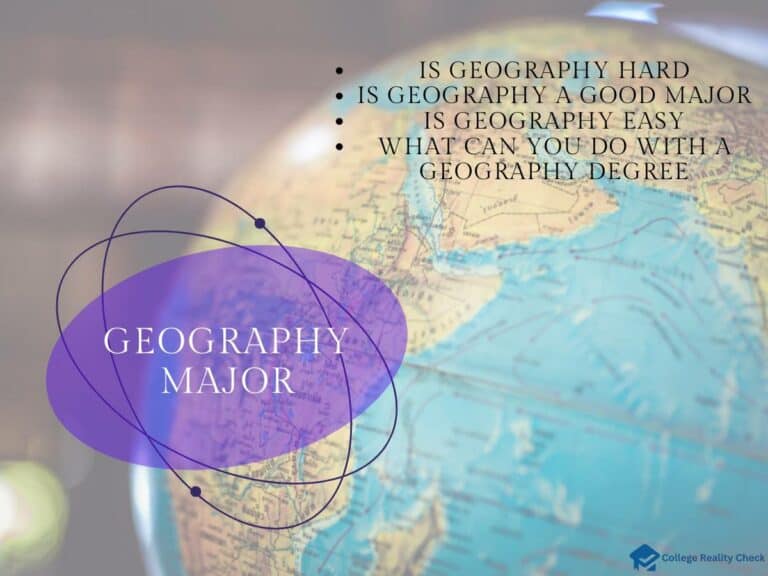Is Environmental Science a Good Degree?
So, you have always been fascinated with your surroundings. And you have always wanted a career that will allow you to connect with the world around you while getting paid. Does this mean that you should put environmental science at the top of your list of college majors and work as an environmental scientist or something related to it one day?
Environmental science is a good degree for individuals who care about the environment and public health, too. The average annual salary of environmental science majors is $80,090. Some of the highest earners are those working in pipeline transportation ($108,170) and natural gas distribution ($107,350).
Read on if you are planning on earning a bachelor’s in environmental science.
In this post, you will come across some of the most important things you need to know before you decide on majoring in environmental science — whether or not it’s right for you, just how difficult a degree it is, your many different career options as an environmental science major, and which schools you should consider attending.

Is an Environmental Science Degree Right for You?
A bachelor’s in environmental science is suited for degree-seeking students concerned with the environment and who would like to give solutions to the many problems the planet is facing. It’s a degree recommended for students who are fond of observing, researching, analyzing and solving problems.
Unlike most degrees, environmental science is fairly new. As a matter of fact, it was only in the 1960s to 1970s when public awareness and concern about various environmental problems boomed.
Due to this, not too many colleges and universities are offering an environmental science degree.
If you are planning on majoring in the discipline of study, needless to say, you will have to check first whether or not the schools you are intending to add to your college list have the program. In a few, we will talk about institutions with some of the best environmental science programs, including online ones — so don’t stop reading now!
Just like what the name suggests, environmental science is a field that combines an assortment of hard sciences, from biology to physics. It also consists of a number of math courses.
But just because you love science and math subjects in high school doesn’t mean right away that your chances of liking and successfully completing a bachelor’s in environmental science program are high.
It’s also a must that you possess some traits and qualities necessary for you to succeed as an environmental science major and professional.
To give you an idea of whether or not it’s the right degree for you, answer the following with a “yes” or “no”:
- Do you find numbers interesting rather than terrifying?
- Are science classes some of your favorite high school classes?
- Can you communicate with others rather well?
- Have you always liked solving puzzles and cracking codes?
- Are you naturally curious and inquisitive?
- Have you always cared about the welfare of the environment?
- Have you also always cared about the well-being of the people around you?
- Do you often find yourself wondering if there are other solutions to problems?
- Can you commit to studying for 50 to 60 hours per week?
- Are you willing to attend graduate school to further your studies?
If you answered mostly “yes”: Chances are that environmental science is the right major for you. That’s because you possess some of the most important attributes and skills of true environmental scientists such as:
- Good communication skills
- Analytical and critical thinking
- Leadership skills
- Team playing skills
- Problem-solving skills
- Thinking out of the box
- Good with math and science
- Commercial awareness
If you answered mostly “no”: Besides environmental science, consider other programs, too. Make sure that you take into account your strengths and weaknesses as well as the career path you would like to take after graduation.

Is Environmental Science Hard in College?
The general consensus is that environmental science is a fairly easy program. This is true even if many of the core courses are math and earth and physical sciences such as calculus, statistics, chemistry, biology and physics. As a matter of fact, CollegeVine ranks environmental science #3 in the Easiest Science Majors.
Provided that you are willing to commit to the program and work hard to get good grades, failing to successfully complete your environmental program should be the least of your worries.
While it’s true that it has a lot of math as well as hard science subjects, environmental science is not as difficult as programs in the STEM field — environmental science is in the realm of liberal arts, and it’s no secret that liberal arts courses are somewhat easy. Still, it will depend on the student’s interests, learning style, willingness to study, etc.
Lower-division courses provide environmental science majors with an introduction to the discipline of study as well as a solid foundation in science and math. They can usually be grouped into different components:
- Introduction to environmental science
- Geographic information systems
- Chemistry
- Biology
- Physics
- Mathematics
- Statistics
Clearly, it will help a lot if math and earth and physical sciences are some of your strongest suits.
On the other hand, upper-division courses, which typically consist of at least 40 credits, provide degree-seeking students with extensive knowledge of the environmental sciences. These courses are usually comprised of the following:
- Physical and life sciences
- Social sciences and humanities
- Sustainability talks
- Practicum in environmental science
The last category, which is a practicum in environmental science, is considered one of the most fundamental parts of the program. That’s because it provides environmental science majors with a hands-on or practical experience they need outside of their classrooms. A practicum in environmental science may consist of 10 or more units.
Some institutions offering environmental science programs have a partnership with public or private entities for students who would like to opt for leadership practicum work to have the opportunity to explore and solve problems.
A few examples of leadership practicum partners include:
- Governmental agencies
- Nature conservancies NGOs
- Primary school districts
- Science research centers
- Solar energy manufacturing companies
According to the US Bureau of Labor Statistics (BLS), employment for environmental science majors is projected to grow by approximately 8% in the next 10 years, which is considered as fast as average.
In order to make your resume a complete standout after earning your bachelor’s in environmental science, it’s a good idea to have a minor or two that complements your major. Doing such allows you to add depth to your concentration, thus allowing potential employers to see that you are exactly who they are looking for.
Some of the minors that complement an environmental science major include:
- Animal behavior
- Biological conservation
- Communication
- Computer science
- Corporate environmental management
- Energy and climate change
- Foreign language
- Marine biology
- Park and protected area management
- Political science
- Psychology
- Sociology
- Sustainability studies
- Water resource management
There are also a few minors with an international component available for environmental science majors who would like to obtain an interdisciplinary perspective on contemporary societal, cultural and global issues:
- Global studies
- International agriculture
- Marine affairs
However, it doesn’t mean that your minor should have something to do with environmental science. If truth be told, you can choose a minor according to your interests and hobbies. As a matter of fact, you can obtain a bachelor’s in environmental science without committing to any minor.

Environmental Science Degree Careers and Salaries
Careers for bachelor’s in environmental science holders can be so varied that it’s difficult to put them under a single category. Some could be working at home, while others could be working in offices. Then there are those that could be doing fieldwork or traveling locally or all over the globe.
An environmental science degree provides students with hands-on experience, which allows them to acquire and hone various transferable skills that can come in very handy when it’s time for them to apply for jobs.
What’s really nice about environmental science majors is that they can choose to take varied career paths.
In 2020, most environmental scientists (25%) were employed by companies offering management, scientific and technical consulting services. A lot of environmental science majors (24%) were working for the state government. The rest were employed by the federal government and companies that provide engineering services.
Wondering where a bachelor’s in environmental science could take you? Check out the following jobs that you may apply for after graduation in order to have an idea of what the possibilities are:
Agricultural scientist
- Median annual salary: $74,160
- Job outlook in 10 years: 9%
Simply put, agricultural scientists are responsible for conducting research on how to improve the efficiency and safety of agricultural products. Due to the nature of their work, agricultural scientists can be found working in offices, laboratories as well as in the field. Some agricultural scientists focus on a specific area, such as plants or the soil.
Environmental educator
- Median annual salary: $61,820
- Job outlook in 10 years: 8%
The everyday task of environmental educators is to make the public aware of the various environmental issues and concerns. Besides students, environmental educators also usually provide information to community members as well as groups that partake in or are associated with environmental organizations or services.
Nature conservation officer
- Median annual salary: $47,370
- Job outlook in 10 years: 11%
As the job title suggests, nature conservation officers manage and protect wildlife, water sources and others. It’s important for these professionals to have leadership as well as team-playing skills. They also need to have good investigative and problem-solving skills as they are also tasked with investigating sources of problems and crimes in wildlife areas.
Meteorologist
- Median annual salary: $94,570
- Job outlook in 10 years: 8%
In a nutshell, what meteorologists do is observe, study and forecast the weather. They can be found working in offices, laboratories and weather stations. While most meteorologists have a bachelor’s in meteorology, individuals with a degree in a related field, including environmental science, are also eligible to take on entry-level meteorology jobs.
Water treatment plant and system operator
- Median annual salary: $47,880
- Job outlook in 10 years: -3%
Managing a system of machines and processes to transfer or treat water or wastewater — such is what water treatment plant and system operators do. Some have a bachelor’s in environmental science or a related field, while others have a high school diploma only. About 10,500 jobs for water treatment plant and system operators open yearly.

Wildlife biologist
- Median annual salary: $64,650
- Job outlook in 10 years: 5%
Basically, what wildlife biologists specialize in is the study of animals and other wildlife as well as how they interact with their respective ecosystems. It’s not uncommon for wildlife biologists to work in offices, laboratories and outdoors, too. Environmental science majors may apply for entry-level jobs — higher-level ones usually require a master’s.
Science editor
- Median annual salary: $63,350
- Job outlook in 10 years: 5%
The primary duty of science editors is to put together textbooks or academic journals consisting of various information about science, from studies, researches to discoveries. Environmental science majors who would like to work as science editors must have excellent organizational, research, writing and editing skills in order to succeed.
Environmental Planner
- Median annual salary: $49,470
- Job outlook in 10 years: 18%
As environmental planners, bachelor’s in environmental science holders are responsible for analyzing infrastructure to determine their potential impact on the environment. Also, they are tasked with looking for ways to mitigate any impact while abiding by state and federal environmental regulations and procedures in the process.
Besides being a part of the workforce after earning their degrees, some environmental science majors also attend graduate schools to obtain a master’s degree — either in environmental science in order to have access to higher-level or higher-paying jobs or another discipline of study, using a bachelor’s in environmental science as a stepping stone.
Just in case you are planning on pursuing a master’s in environmental science, the following are just some of the jobs that your resume can make you highly qualified for:
- Atmospheric scientist
- Climate change specialist
- College professor
- Ecologist
- Environmental consultant
- Geoscientist
- Hydrologist
- Land surveyor
- Research technician
- Wildlife biologist

Best Schools for Environmental Science Majors
Because environmental science is often considered a part of the liberal arts, it isn’t surprising why some of the best environmental science programs come from liberal arts schools or institutions offering liberal arts education. Many online colleges and universities also offer good environmental science programs.
If you want nothing but the best environmental science degree, look no further — some of the best come from highly ranked colleges and universities.
Many are Ivy Leagues, while there are also those with Ivy-like statuses.
As mentioned earlier, not a lot of institutions have environmental science degrees given the fact that the discipline of study is fairly new. But fret not because US News has shortlisted schools offering some of the most impressive environmental science degrees, and they are the following:
| INSTITUTION | US NEWS RANKING |
| Stanford University | #1 in Environmental Science |
| Pennsylvania State University – University Park | #2 in Environmental Science |
| University of California – Berkeley | #2 in Environmental Science |
| Columbia University | #4 in Environmental Science |
| Arizona State University | #5 in Environmental Science |
| California Institute of Technology | #6 in Environmental Sciences |
| Massachusetts Institute of Technology | #7 in Environmental Sciences |
| University of California – Davis | #8 in Environmental Sciences |
| University of Michigan – Ann Arbor | #8 in Environmental Sciences |
| Duke University | #10 in Environmental Sciences |
| Ohio State University | #10 in Environmental Sciences |
Besides a traditional bachelor’s in environmental science, you may also choose to get your hands on an online degree in environmental science instead, which is more suitable for non-traditional students.
But before deciding to take this route, make sure that you enroll only in an accredited online school.
Top 5 Online Schools for Environmental Science Majors
Fortunately, there are many online colleges and universities that have accreditation from an accreditor recognized by the US Department of Education (USDE) and the Council of Higher Education Accreditation (CHEA). And because they are accredited, you can have peace of mind that the environmental science degree you will earn has value.
The following are some of the best online schools offering a bachelor’s program in environmental science together with some important matters you might want to know, too:
Columbia Southern University
- Location: Orange Beach, Alabama
- Cost: $245 per credit hour
- Accreditor: Distance Education Accrediting Commission (DEAC)
- Acceptance rate: 100%
- Graduation rate: 35%
- Population: 6,866
- Average starting salary: $61,800 per year
- College ranking: #2 in Cheapest Colleges in Alabama by In-State Tuition (CollegeCalc)
Pennsylvania State University – World Campus
- Location: University Park, Pennsylvania
- Cost: $590 per credit hour
- Accreditor: Middle States Commission on Higher Education (MSCHE)
- Acceptance rate: 54%
- Graduation rate: 29%
- Population: 2,564
- Average starting salary: $50,100 per year
- College ranking: #16 in Best Online Bachelor’s Programs (US News)
University of Maryland Global Campus
- Location: Adelphi, Maryland
- Cost: $306 per credit hour
- Accreditor: Middle States Commission on Higher Education (MSCHE)
- Acceptance rate: 100%
- Graduation rate: 18%
- Population: 10,425
- Average starting salary: $51,200 per year
- College ranking: #8 in Best Online Colleges and Top Online Universities 2022 (Best Colleges)
American Public University System
- Location: Charles Town, West Virginia
- Cost: $285 per credit hour
- Accreditor: Higher Learning Commission (HLC)
- Acceptance rate: 100%
- Graduation rate: 41%
- Population: 2,522
- Average starting salary: $51,300 per year
- College ranking: #27 in Best Environmental Science Schools (College Factual)
St. Petersburg College
- Location: Clearwater, Florida
- Cost: $336 per credit hour
- Accreditor: Southern Association of Colleges and Schools Commission on Colleges (SACSCOC)
- Acceptance rate: 100%
- Graduation rate: 33%
- Population: 8,152
- Average starting salary: $32,900
- College ranking: #80 in Best Online Bachelor’s Programs (US News)
Just Before You Enroll in an Environmental Science
Despite having math and earth and physical sciences, environmental science is a fairly easy degree to complete. Still, it can open doors to a lot of job opportunities, many of which pay higher than the median salary across all occupations.
Majoring in environmental science may also be used as a stepping stone to further one’s education — besides applying for a job after graduation, you can also use your bachelor’s in environmental science to go to graduate school to obtain a master’s in the very same discipline of study, a closely related one or a completely unrelated concentration.
Read Next: Is Forensic Science a Good Career?
Disclaimer: The views and opinions expressed in this article are those of the authors and do not necessarily represent those of the College Reality Check.





